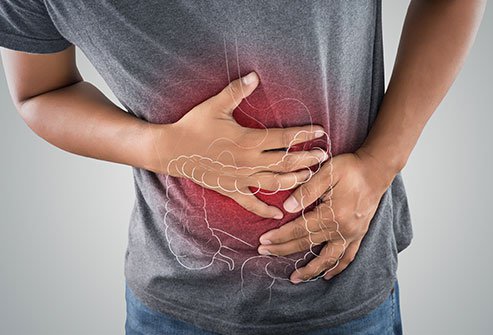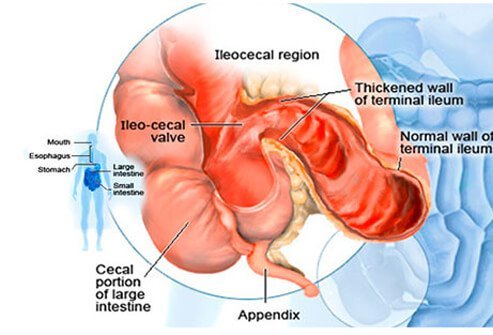What are Crohn’s disease and ulcerative colitis (UC)?

Both Crohn’s disease and ulcerative (UC) cause abdominal pain.
- Both Crohn’s disease and ulcerative colitis, or UC, are types of IBD (inflammatory bowel disease), but they are not the same disease.
- Crohn’s disease is a chronic inflammatory process with no known cause (idiopathic) that can affect any part of the gastroesophageal (GI) tract from the mouth to the anus.
- Ulcerative colitis (UC) also is a chronic and intense inflammatory process, with no known cause, but it is only confined to the large bowel.
- People with Crohn’s disease have episodes of abdominal pain and diarrhea, followed by remission of symptoms. There is no medical or surgical cure for Crohn’s disease.
- Ulcerative colitis symptoms and signs are predominantly
- left-sided lower abdominal pain with rectal bleeding,
- frequent stools, and
- a mucousy rectal discharge.
- There is no medical cure for ulcerative colitis, but surgical removal of the entire large intestine can cure it. However, there can be complications after surgery.
- Crohn’s disease sometimes is referred to as Crohn disease.
- Although both Crohn’s disease and ulcerative colitis are chronic diseases, UC may be considered “worse,” as people with extensive and severe ulcerative colitis may require surgery.
- People over age 50 that need surgery have increased mortality due to colitis-associated postoperative complications.
Is Crohn’s Disease Contagious?
Researchers and doctors don’t know the exact cause of Crohn’s disease, but it is not contagious. They do know that it causes inflammation of the gastrointestinal tract (from mouth to the rectum), and it runs in some families (may be genetic).
What are the differences and similarities between the signs and symptoms of Crohn’s and ulcerative colitis?

Picture of the areas affected by Crohn’s disease and ulcerative colitis.

Picture of the areas affected by ulcerative coilitis.
Differences between symptoms and signs of Crohn’s disease and ulcerative colitis
There are a few differences in the symptoms between ulcerative colitis and Crohn’s disease. Frequently, doctors cannot diagnose the cause of either disease by symptoms alone. However, for people with ulcerative colitis, the abdominal pain is often confined to the left side of the abdomen, while Crohn’s disease may have abdominal pain anywhere in the abdomen.
Similarities between symptoms and signs of Crohn’s disease and ulcerative colitis
Both Crohn’s disease and ulcerative colitis have many similar symptoms.
- Abdominal pain
- Diarrhea (sometimes bloody and/or containing mucus)
- Bloating
- Abdominal cramps
- The urgency to have a bowel movement (defecate)
- Anorexia
- Nausea/vomiting
- Constipation
- Weight loss

SLIDESHOW
Crohn’s Disease: Symptoms, Causes, Diet See Slideshow
What are the causes and triggers of Crohn’s disease vs. ulcerative colitis?
Doctors and researchers do not know what causes both diseases, but they speculate that several factors such as genetics, heredity, mucosal immunity, gut microbes, diet, environmental factors, vascular problems, psychosocial problems, and certain drugs may be triggers that may participate in causing these diseases.
Because the diseases have unknown causes, it is difficult to know what triggers their development. However, if you carefully note in a diary when symptoms reappear in Crohn’s disease or worsen in ulcerative colitis, you may be able to identify triggers that affect your disease.
Can you drink alcohol with Crohn’s disease?
- Drinking alcohol is not recommended for most people with Crohn’s disease.
- Alcohol may irritate the lining of the intestinal wall, causing or worsening symptoms such as vomiting, diarrhea, and bleeding.
- It also may contribute to malabsorption, further complicating nutritional deficiencies.
- Alcohol interacts with many medications, causing side effects that may be serious.
- Alcohol disrupts sleep cycles and can leave you feeling tired, and irritable the next day. However, if alcohol is well tolerated and does not cause any complications, it can be consumed in moderation.
- Chronic diarrhea can lead to dehydration very easily.
- Dehydration makes you feel weak, tired, light-headed, or just “blah.”
- Alcohol can cause headaches, abdominal pain, and other symptoms. It also can place a dangerous strain on your kidneys.
- Dehydration can be avoided by making a special effort to take in plenty of nonalcoholic fluids.
- You should take at least 8 full glasses of fluid every day.
- Try to stick to water, diluted fruit juice, sports drinks, decaffeinated beverages, and fruit and vegetable drinks.
- Avoid caffeinated beverages and sodas.
Latest Digestion News
Daily Health News
Trending on MedicineNet
What procedures and tests diagnose Crohn’s disease and ulcerative colitis?
Doctors diagnose ulcerative colitis by endoscopy (sometimes with biopsy). During this procedure, the doctor can see and take pictures of the patient’s abnormal gut mucosa (often with ulcers), and the presence of continuous disease (there are no areas of normal mucosa). Other blood tests and imaging tests like CT scans or MRI are used, but these tests are not definitive.
Doctors use the same procedures and tests to diagnose Crohn’s disease. However, they also use small bowel studies, colonoscopy, and upper GI endoscopy to identify the abnormal gut mucosa that usually occurs in multiple areas anywhere in the intestinal tract. These areas are not continuous but are separated by normal areas of the intestinal mucosa that distinguish them from ulcerative colitis lesions.

QUESTION
What is Crohn’s disease? See Answer
Are there special diet plans or supplements for Crohn’s disease vs. ulcerative colitis?
- There is no evidence that diet has anything to do with causing inflammation or Crohn’s disease.
- There is no evidence linking food allergies, and inflammation, with Crohn’s disease.
- There is no specific diet that is recommended for everyone with Crohn’s disease. However, many people with Crohn’s disease can reduce their symptoms by changing their eating habits or avoiding certain foods.
- Nutritional deficiencies are a problem for almost everyone with Crohn’s disease, but they are most serious in children and teens who are still growing.
- Growth can be stunted permanently and sexual development (puberty) delayed in children and teens with Crohn’s disease.
- Girls and women can develop hormone imbalances and stop menstruating.
- Nutritional deficiencies also can prevent medications from working as well as they should in healthy people.
- In general, nutritional deficiencies can lead to overall poor health. If you have enough nutritional deficiencies they can make you feel
- Crohn’s disease can leave you vulnerable to infections and other diseases.
- They can stop anyone from looking, feeling, or performing at his or her best.
As with Crohn’s disease, nutrition is important if you have ulcerative colitis because symptoms of diarrhea and bleeding can lead to dehydration, electrolyte imbalance, and loss of nutrients. It may be necessary to take nutritional supplements if your symptoms do not allow you to eat a nutritionally balanced diet. Talk to your healthcare professional about what supplements to take.
Subscribe to MedicineNet’s General Health Newsletter
By clicking Submit, I agree to the MedicineNet’s Terms & Conditions & Privacy Policy and understand that I may opt out of MedicineNet’s subscriptions at any time.
What supplements should you take for Crohn’s disease vs. ulcerative colitis?
Crohn’s disease nutritional diet deficiencies
- Your need for vitamin and mineral supplements depends on several factors, your diet, which parts of your digestive tract are affected, and whether you have had surgery on your small intestine.
- The most common vitamin deficiencies are
- And the most common mineral deficiencies are
- iron,
- calcium,
- potassium, and
- magnesium.
- You will need to take folic acid if you are taking an immunosuppressant such as azathioprine (Azasan, Imuran) as it reduces the absorption of folic acid.
- Talk to your healthcare professional about taking supplements.
Ulcerative colitis nutritional deficiencies
As with Crohn’s disease, nutrition is important if you have ulcerative colitis because symptoms of diarrhea and bleeding can lead to dehydration, electrolyte imbalance, and loss of nutrients. It may be necessary to take nutritional supplements if your symptoms do not allow you to eat a nutritionally balanced diet. Talk to your healthcare professional about what supplements to take.
What foods can you eat on a ulcerative colitis diet?
If you have ulcerative colitis you may need to modify your diet to help manage the symptoms. There is not a single diet or meal plan that fits everyone with ulcerative colitis, and diets are individualized for each patient.
Depending on symptoms different types of diets may be recommended, such as:
From 
Crohn’s Disease Resources
Featured Centers
Health Solutions From Our Sponsors
What are the treatments for Crohn’s vs. ulcerative colitis?
- Ulcerative colitis and Crohn’s disease treatments may include corticosteroids, anti-inflammatory agents, tumor necrosis factor inhibitors, immunosuppressants, antibiotics, Alpha 4 Integrin inhibitors, and anti-diarrheal agents.
- Crohn’s disease treatments also may include anticholinergic agents and bile acid sequestrants, if there is no bowel obstruction.
- Severe ulcerative colitis may require surgical removal of the large intestine.
Treatments are complex, and some drugs should not be used for long periods. You and your team (primary care and gastroenterologist) should discuss what treatment protocol you should follow.
Can complications of Crohn’s disease or ulcerative colitis be fatal?
The prognosis for both diseases is fair to good in individuals that respond to medical therapy and avoid known triggers that increase symptoms. Most people can have a normal lifespan. However, for people with severe ulcerative colitis that are 50 years of age or older and require surgery, their lifespan may be reduced due to colitis-associated postoperative complications.
Medically Reviewed on 5/23/2022
References
Basson, MD, MD, et al. Ulcerative Colitis. Medscape. Jul 06, 2019.
<http://emedicine.medscape.com/article/183084-overview>